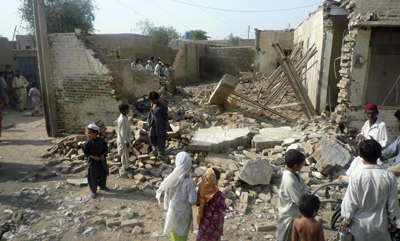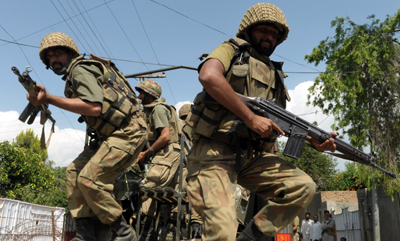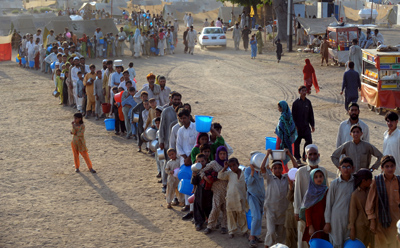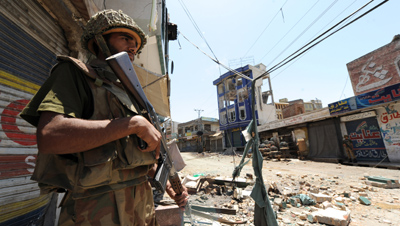
Government, media can limit risk to journalists
The fighting along the border in Pakistan is a classic counter-insurgency: a large military force trying to oust an entrenched group from its base. Such armed conflict will always be risk-filled—especially for local journalists—but government leaders, military officials, and media executives can take basic steps to improve security.

In Pakistan’s frontier, echoes of a 2006 murder
Local reporters like those in Federally Administered Tribal Areas, Swat, and Mingora are crucial to accurate, fully formed news coverage. Their importance was evident in August, when reports began to emerge that prominent Taliban leader Baitullah Mehsud had been killed by a U.S.-launched missile apparently fired from an unmanned drone over South Waziristan in the…

Value, ‘collateral damage’ as journalists embed
During the height of the Pakistani military’s assault on militants, hundreds of local journalists were forced to flee the Swat Valley and neighboring areas. Coverage of the fighting was left in large part to Pakistani reporters from outside the region who had embedded with the military. These journalists faced their own set of challenges.

As combat raged, local reporting was stifled
Yesterday, I reported on the plight of Behroz Khan and Rahman Bunairee, two Pakistani journalists whose homes were destroyed by militants. Many other journalists in the North West Frontier Province, or NWFP, faced grave dangers and were forced to flee, undermining independent reporting in the region. The same early July night that Khan and Bunairee’s homes…

In Pakistan conflict, grave risks for reporters
The September 30 Daily Times in Pakistan headlined a story “Peace being gradually restored in Swat,” although daily skirmishes continue between the military and militants. A few days earlier, a massive car bomb in the heart of Peshawar killed at least 10 people and left some 70 wounded, while an explosion destroyed a police station…
Attacks on the Press in 2008: Pakistan
Military leader Pervez Musharraf resigned as president in August under threat of impeachment, leaving a decidedly mixed legacy on press freedom. As his power waned in late 2007, Musharraf shut down all independent broadcasters for a time and then tried to impose a rigid “code of conduct” on the stations.
Arrest in 2006 killing of Pakistani cameraman
New York, April 16, 2008—The Committee to Protect Journalists welcomes Pakistani news reports of the arrest of a provincial government minister in the killing of Munir Sangi, a cameraman for the Sindhi-language Kawish Television Network (KTN). Sangi was shot in May 2006 while covering a gunfight between members of the Unar and Abro tribes in…
Attacks on the Press 2006: Asia Analysis
Afghan-Pakistani border off-limits to most journalists By Bob Dietz The Afghanistan-Pakistan border is a critical front in the most challenging news story in the world: the confrontation between U.S.-led Western countries and militant Islamists. Yet access to the border region has become increasingly restricted, and the Pakistani government continues to do everything in its power…
Attacks on the Press 2006: Pakistan
PAKISTAN The military-backed government of President Pervez Musharraf, now in its eighth year, said in 2006 that it was fostering a free press, but the details belied the claim, and journalists continued to be targeted from many sides. While the government has allowed the expansion of broadcast media, a three-person CPJ delegation that met with…
CPJ urges government to fulfill promise by releasing records
Dear Minister Sherpao and Secretary Shah: The Committee to Protect Journalists is disturbed by the Interior Ministry’s failure to publicly produce investigative records as promised in regard to the deaths of eight journalists and to attacks and detentions involving more than 50 others in Pakistan since 2002.